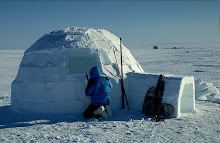
Once upon a time, Socrates had an idea.
If he allowed students to have structured dialogues between themselves, he theorized, they might, just might, come up with some intelligent ideas of their own in the discussion.
Socrates believed that it was important for students to think for themselves instead of just having him fill their head with alleged "correct" answers.
A good Socratic seminar suspends biases and allows students to listen and question each other based on a discussion. The discussion is exploratory; that is, there is no specific "end point" that has to be reached in the discussion.
In today's discussion, several good points were made throughout the discussion. Characters, symbolism and the idea of authority were discussed, along with whether or not cockroaches have eyelids.
A character development question was raised: Why didn't Gregor Samsa leave?
So, what were your opinions of the Socratic Circle? Do you have any suggestions on how it could have been improved? Did you learn anything from this experience?
For Homework:
We will have our Irish Literary Festival on Friday.
If you can find a poem, literary piece, or biographical information on an Irish author, bring it along.
Today is also the birthday of Jack Kerouac, born Jean-Louis Kerouac in Lowell, Massachusetts (1922). He was part of the "Beat Generation," and he came up with the name. He said, "To me, it meant being poor, like sleeping in the subways ... and yet being illuminated and having illuminated ideas about apocalypse and all that." Later, Kerouac decided that "beat" stood for "beatific."
His parents were from French-speaking Quebec, and he did not start learning English until grade school. He skipped second and third grades, and as a 16-year-old senior, he ditched class in order to go alone to the public library and read what he wanted: Hugo, Goethe, Hemingway, William Saroyan, Thomas Wolfe, history books, the Encyclopedia Britannica, and books of chess problems. He was a good football player and received a scholarship to Columbia University, but he broke his leg in the first season and didn't play anymore. He dropped out of Columbia, joined the Merchant Marine and then the Navy, and was given a psychiatric discharge after only two months, having been labeled as a "schizoid personality." The next fall, he went back to Columbia where he dropped out again almost immediately, but kept his apartment near campus and it became a gathering place for young intellectuals. During that time, he met Allen Ginsberg, William S. Burroughs, Carl Solomon, Neal Cassady, and others who would help found the Beat Movement.
He spent the next seven years hitchhiking around the United States and Mexico, and in 1949 he and his friend Neal Cassady drove a Cadillac limousine from California to Chicago, going over 100 miles an hour on two-lane roads until the speedometer broke. In 1951, he sat at his kitchen table, taped sheets of Chinese art paper together to make a long roll, and wrote the story of Cassady and their trips. It had no paragraphs and very little punctuation. Allen Ginsberg called it "a magnificent single paragraph several blocks long, rolling, like the road itself." It took him only three weeks to complete and became his novel On the Road (1957).

4 comments:
thanks for the recognition of Kerouac's birthday, and the little bio to go along....On the Road is by far my favorite book.
I absolutely love the Irish and I equally love soda bread! But I never realized how ubiquitous Irish poetry/ literature truly is: Yeats, Heaney, Joyce, Carleton, Moore...and I also wonder if J.K. Rowling borrowed some of her fantastical plots from Irish Folk Tales. I bought a book of Irish Fairy/ Folk Tales that Yeats compiled/ edited. In it, there are bewitched puddings, leprechauns, ghosts, giants, devils, kings, fairies, changelings...what mythological and poetic genius! in short, I am excited for tomorrow
I read "On the Road" for the first time when I was about 18- it had a huge influence on my life, and probably one of the biggest contributors to the wanderlust that took me to Alaska.
I love that Kerouac wrote on a roll of paper to evoke a "road".
Vanessa, the Irish are responsible for All Things Cultural (she said, tongue in cheek.).
There is a book called "How the Irish Saved Civilization" which postulates that Irish monks & scribes were responsible for preservation of written traditions during the Dark Ages. Well, the Irish can be fairly pompous...
I think you have a point, though, that much of folklore complied by Yeats led to an almost archetypal view of the characters in fantasy fiction- Tolkien, Rowling, perhaps even Douglas Adams all draw from these traditions.
Yeats is arguably the person responsible for the Irish Renaissance movement. He brought a native cultural tradition of folklore, poetry, ballads, and song to a place where it was no longer seen as backwards, but as a source of cultural pride.
Post a Comment